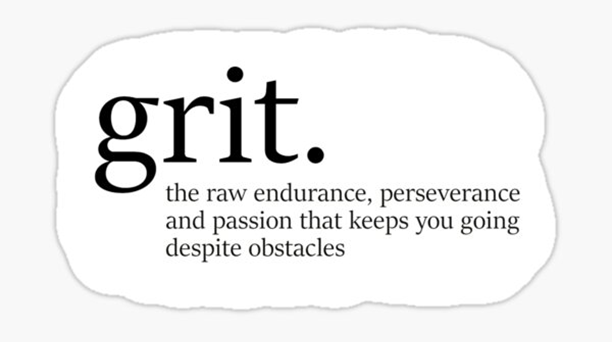5.8 Resilience and Grit
Questions to consider:
- What are some examples of times when you have demonstrated resilience in the face of adversity?
- What strategies do you use to stay motivated and focused when pursuing long-term goals?
- How do you bounce back from failure, and what have you learned from your past failures?
Grit can be defined as personal perseverance toward a task or goal. In learning, it can be thought of as a trait that drives a person to keep trying until they succeed. It is not tied to talent or ability but is simply a tendency to not give up until something is finished or accomplished.

This personality trait was defined as “grit” by the psychologist Angela Duckworth. In a 2007 study Duckworth and colleagues found that individuals with high grit were able to maintain motivation in learning tasks despite failures. The study examined a cross section of learning environments, such as GPA scores in Ivy League universities, dropout rates at West Point, rankings in the National Spelling Bee, and general educational attainment for adults. What the results showed was that grit and perseverance were better predictors of academic success and achievement than talent or IQ.
In the college setting, Angela Duckworth’s definition of grit remains the same: it is the combination of passion and perseverance for long-term goals. However, she explains that grit in the college setting is particularly important because college is a time when students face significant challenges and setbacks.
According to Duckworth, grit in college involves several key components. Firstly, it requires having a clear sense of purpose or direction, which allows students to stay motivated and focused on their goals. Secondly, it involves the ability to persevere in the face of adversity, such as academic difficulties, personal challenges, or social pressures. This means being able to stay committed to one’s goals despite setbacks or failures.
Thirdly, grit in college also involves developing effective strategies for learning and problem-solving. This means being able to adapt to new situations, seek out feedback and support, and persist through challenging coursework.
Overall, Duckworth emphasizes that grit is a key factor in college success, as it allows students to stay focused, motivated, and resilient in the face of challenges. By developing grit, students can increase their chances of achieving their long-term academic and career goals.

College students can apply grit in several ways:
- Set clear goals: College students can apply grit by setting clear and specific goals that align with their values and interests. These goals should be challenging yet achievable and should provide a sense of direction and purpose.
- Focus on long-term success: Gritty college students understand that success is not immediate and requires consistent effort over time. They focus on the long-term and avoid distractions that may interfere with their goals.
- Persevere through challenges: College students can apply grit by persisting through challenges and setbacks. This may involve seeking out support and resources, developing effective problem-solving strategies, and maintaining a positive attitude.
- Practice self-discipline: Gritty college students practice self-discipline by developing habits that support their goals, such as prioritizing their time, staying organized, and avoiding procrastination.
- Embrace failure as an opportunity to learn: Gritty college students view failure as a natural part of the learning process and use it as an opportunity to reflect on their progress and adjust their approach.
- Purpose is a major contributor to anything we pursue. If you have a strong purpose in any activity, you have reason to persist at it. Think in terms of end goals and why doing something is worth it. Purpose answers the question of “Why should I accomplish this?”
- Have hope in what you are doing.
By applying these strategies, college students can cultivate grit and increase their chances of achieving their long-term academic and career goals.
Case scenario
Rodrigo’s story is an example of applying grit. He is a first-generation college student who grew up in a low-income family. He had to work part-time jobs throughout high school to support his family, and he faced numerous academic challenges due to a lack of resources and support. Despite these challenges, Rodrigo was determined to attend college and pursue a degree in engineering. During his first semester, Rodrigo struggled to keep up with the rigorous coursework and balance his job and family responsibilities.
However, he refused to give up on his dreams and sought out academic support services, such as tutoring and study groups. He also reached out to professors and advisors for guidance and mentorship. With hard work and perseverance, Rodrigo gradually improved his grades and became more confident in his academic abilities. He also joined several student organizations and began to build a supportive network of peers and mentors.
Over time, Rodrigo’s determination and grit paid off, and he earned a high GPA and was even offered a scholarship for his outstanding academic performance. Despite facing numerous challenges, Rodrigo’s commitment to his goals and his willingness to seek out help and support allowed him to overcome obstacles and achieve success in college.
A psychological tendency that can undermine motivation is negative self-talk. Negative self-talk can lead individuals to dwell on negative thoughts and feelings, which can undermine their motivation and persistence. This can make it difficult for individuals to maintain their focus on long-term goals, especially when faced with setbacks or challenges.
Grit and negative self-talk are connected in that individuals with high levels of grit are more likely to resist negative self-talk. Individuals with high levels of grit tend to be more resilient and better able to cope with adversity. They have a powerful sense of purpose and are committed to achieving their goals. Overall, grit can be a valuable trait in combating negative self-talk, as it can help individuals stay committed, motivated, and resilient in the face of challenges.

What follows are methods for overcoming negative self-talk. Each focus on being aware of any negative attitude or emphasizing the positive aspects in a situation.
Awareness
The first step in overcoming negative self-talk is to become aware of them.
Challenging negative thoughts
Once you have identified negative self-talk, challenge them by asking yourself if they are accurate or if there is evidence to support them. Often, self-talk is based on assumptions and beliefs that are not necessarily true.
Reframing
Reframe negative thoughts into more positive and constructive ones. Instead of focusing on the negative, try to find a positive aspect of the situation or challenge. For example, instead of saying “I can’t do this,” reframe it as “This is a challenge, but I am capable of overcoming it.”
Positive self-talk
Practice positive self-talk regularly. This involves intentionally replacing negative thoughts with positive ones. For example, instead of saying “I’m not good enough,” say “I am capable and confident.”
Keep a gratitude and accomplishment journal
Sometimes we need help remembering positive experiences, and we can prompt our memories by keeping a journal. In your journal you can write or paste anything that you appreciated or that has positive outcomes. Whenever you are not feeling up to a challenge or when negative self-talk is starting to wear on you, you can look over your journal to remind yourself of previous accomplishments in the face of adversity.
Seeking support
Surround yourself with people who are positive and supportive. This can help you maintain a positive mindset and provide encouragement when you are struggling with negative self-talk. Seek out a therapist or counselor if you need additional support.
Overall, overcoming negative self-talk requires intentional effort and practice. By becoming aware of these patterns of thinking, challenging, and reframing negative thoughts, practicing positive self-talk, and seeking support, you can develop a more positive and constructive mindset.
Quick Quiz 5.8
- What are two ways you can apply grit today?
- What are strategies to overcome negative self-talk?
Licenses and Attribution
CC Licensed Content
- College Success by Amy Baldwin is licensed CC BY. Access for free.
References
- Arduini-Van Hoose, Nicole. Behaviorism and Motivation. Hudson Valley Community College, https://courses.lumenlearning.com/edpsy/chapter/behaviorism-and-motivation/. CC BY-NC-SA.
- Borich, Gary D., and Martin L. Tombari. Educational Psychology. CC BY.
- Bohlin. Educational Psychology. CC BY.
- Chiquo. Maslow’s Hierarchy of Needs. Wikimedia Commons, https://upload.wikimedia.org/wikipedia/commons/8/88/Maslow%27s_Hierarchy_of_Needs.jpg. CC BY-SA.
- —. Deficiency-Growth Theory: Maslow’s Hierarchy of Needs. Hudson Valley Community College, https://courses.lumenlearning.com/edpsy/chapter/deficiency-growth-theory/. CC BY-NC-SA.
- DoD News. (n.d.). [Photograph of Will Reynolds racing to the finish line]. Flickr. https://www.flickr.com/photos/dodnewsfeatures/
- Duckworth, Angela L., et al. “Grit: Perseverance and Passion for Long-Term Goals.” Journal of Personality and Social Psychology, vol. 92, no. 6, June 2007, pp. 1087–1101. https://doi.org/10.1037/0022-3514.92.6.1087.
- Dweck, Carol S., and Ellen L. Leggett. “A Social-Cognitive Approach to Motivation and Personality.” Psychological Review, vol. 95, no. 2, 1988, pp. 256–273.
- —. Educational Psychology. OER Commons, https://www.oercommons.org/courses/edpsych/view.
- —. Expectancy-Value Theory. Hudson Valley Community College, https://courses.lumenlearning.com/edpsy/chapter/expectancy-value-theory/. CC BY-NC-SA.
- Kahn, I. (n.d.). [Man sitting on a bench with his head in his hands] [Photograph]. Pexels. https://www.pexels.com
- “Learning to Learn.” OER Commons, https://www.oercommons.org/courseware/lesson/73880/overview?section=5.
- Lucas, Laura, Heather Syrett, and Edgar Granillo. Personal Learning Preferences. Austin Community College. CC BY-NC-SA 4.0.
- “Metacognition (Flavell).” Learning Theories, https://www.learning-theories.com/metacognition-flavell.html.
- “Multiple Intelligences.” Educational Psychology, https://courses.lumenlearning.com/educationalpsychology/chapter/multiple-intelligences/. CC BY.
- —. Self-Determination Theory. Hudson Valley Community College. CC BY-NC-SA.
- —. Self-Efficacy Theory. Hudson Valley Community College, https://courses.lumenlearning.com/edpsy/chapter/self-efficacy-theory/. CC BY-NC-SA.
- —. Social Cognitive Learning Theory. Hudson Valley Community College.
- Spielman, Rose M., William J. Jenkins, and Marilyn D. Lovett. Psychology 2e. OpenStax, https://openstax.org/books/psychology-2e. CC BY.
- Stoltz, Paul G. GRIT: The New Science of What It Takes to Persevere, Flourish, Succeed. ClimbStrong Press, 2014.
- —. Theories of Motivation. Hudson Valley Community College. CC BY-NC-SA.
- Thompson, Penny. Foundations of Educational Technology. CC BY-NC 4.0, except where otherwise noted.
Images or Graphic Elements
- Images used by permission from Alamo Colleges District Department of Communications.

